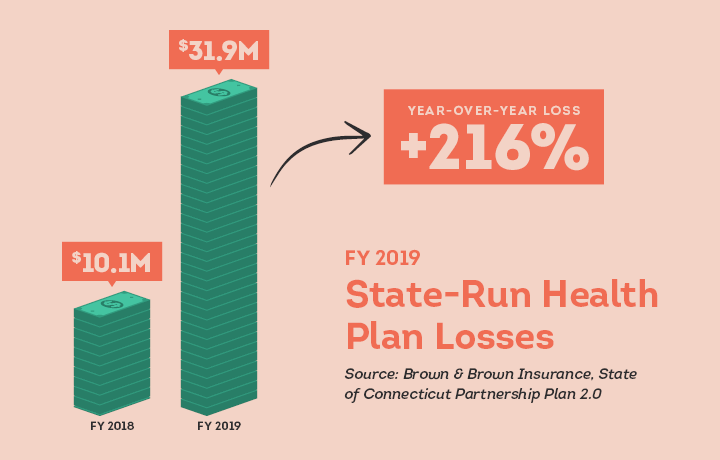State-Run Healthcare to Dominate 2021 Legislative Agenda

At a press conference on the north steps of the state Capitol building Nov. 12, Democratic legislative leaders, the Universal Healthcare Foundation of Connecticut, and state comptroller Kevin Lembo kicked off a renewed push to implement a public option healthcare plan.
Citing the foreseeable gridlock in Washington and Democratic pick-ups in both the state Senate and House in last week’s election, Rep. Sean Scanlon (D-Guilford) told reporters that “the voters gave us a mandate to work on this issue.”

While specifics of the public option bill were not offered at the press conference, Lembo did indicate that legislation would likely mirror proposals raised in 2019 and 2020.
“Speaking for me, and based on the bill we saw last year,” Lembo said, “we are likely to see the leveraging of the state employee pool with 220,000 lives.”
The Past Is Prologue
Legislation raised in previous legislative sessions failed due to heavy pushback from the business and insurance community about solvency and negative economic impacts.
Last year, SB 356 would have allowed small employers to purchase health coverage for employees through the expansion of the state-run State Employee Partnership Plan.
CBIA raised serious concerns on behalf of the thousands of small businesses it represents during public hearings and meetings with proponents of the proposed bill.
When asked what will happen if claims exceed premiums as in previous years, the comptroller said “the backstop is the state of Connecticut.”
Chief among those concerns was the current insolvency of the state-run municipal partnership plan, which lost $31.9 million in 2019, tripling its losses from the previous year.
Due to this loss, the plan operated at a medical loss ratio of 108.4%, up from 105.2% the previous year.
If a private insurer offered plans with a similar MLR, the Connecticut Insurance Department would discontinue those plans.
But because the prospective public option plan would be regulated by the comptroller, not the insurance department, his office can continue to suppress premiums and operate at a loss without penalty.
Taxpayer Subsidized
This issue was addressed today when reporters asked the comptroller what would happen if claims exceed premiums as they had in previous years. In response, Lembo responded “the backstop is the state of Connecticut.”
SB 356 also called for the state to subsidize premium costs for plan enrollees who do not qualify for cost-sharing subsidies under the Affordable Care Act.
An affordability scale, proponents of the bill argued, would be determined for premium rates based on an enrollee’s household income.
However, the bill did not provide whether participants or taxpayers would be responsible for funding the plan; a great potential burden for a state which faces dire fiscal constraints following the economic fallout of the COVID-19 pandemic.
Lawmakers were consistent in saying that a public option is not a panacea for the state’s healthcare issues.
Scanlon and other Democratic lawmakers said reform measures, such as the establishment of a reinsurance program previously championed by Sen. Kevin Kelly (R-Stratford), will also be considered.
Looking Forward
One notable absence from today’s press conference was Gov. Ned Lamont, who Lembo said he had spoken with the previous day.
Earlier this year, Lamont told WSHU Radio he did not support a state public option health plan promoted by Democrats, and instead showed an interest in cost-saving measures via executive orders.
The first executive order signed earlier this year directed the Office of Health Strategy to issue cost growth and quality benchmarks.
The governor has said he does not support a public option, and instead showed an interest in cost-saving measures via executive orders.
The second directed the Department of Social Services to improve transparency of Medicaid costs and quality.
With the 2021 legislative session right around the corner, we are likely to see more information regarding the public option proposal in the coming weeks. But expect this issue to dominate the legislative agenda come January.
For more information, contact CBIA’s Wyatt Bosworth (860.244.1155) | @WyattBosworthCT
RELATED
EXPLORE BY CATEGORY
Stay Connected with CBIA News Digests
The latest news and information delivered directly to your inbox.


